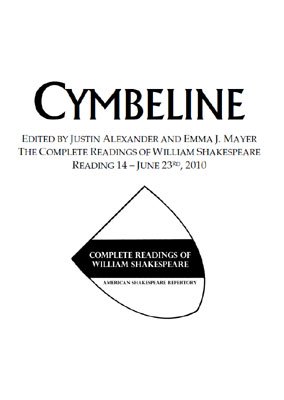 The First Folio of 1623 is our only original source for Cymbeline, and so naturally the ASR script for the play is based upon it.
The First Folio of 1623 is our only original source for Cymbeline, and so naturally the ASR script for the play is based upon it.
In working with the script, it quickly became apparent that a heavier hand than usual would need to be employed with emending the punctuation of the text: At some point there was either a scribe or a typesetter who was passionately enamored with commas, and Cymbeline became dedicated to their love. In addition to a wide practice of what can only be described as random commatization, one can be ensured upon finding an “and” or a “but” in the original text that a comma will be strategically inserted immediately before it (even if it renders the sentence into utter nonsense).
This love affair with the comma is strewn everywhere, and their use is so frequently contrary to any sense that even when they can be hammered into some semblance of sense, I feel there is good cause to doubt them.
NOT-SO-LOOSE VERSE
Another aspect of the Cymbeline text to note is the ease with which a great quantity of seemingly irregular verse in the play can be trivially regularized. For example, the text beginning on page 2 reads, in the original Folio text:
By her election may be truly read, what kind of man he is.
2 I honor him, euen out of your report.
But pray you tell me, is she sole childe to’th’King?
1 His onely childe:
Which virtually all modern editions (including the ASR script), regularize to:
By her election may be truly read
What kind of man he is.
2 GENTLEMAN I honor him
Even out of your report. But pray you tell me,
Is she sole child to the king?
1 GENTLEMAN His only child:
But there are longer passages as well. For example, his passage from Act 3, Scene 7 (pg. 41):
In our script you can read the corrected scansion as:
IMOGEN To Milford-Haven.
BELARIUS What’s your name?
IMOGEN Fidele, sir:
I have a kinsman who is bound for Italy;
He embark’d at Milford, to whom being going,
Almost spent with hunger, I am fall’n in this offense.
BELARIUS Prithee (fair youth) think us no churls,
Nor measure our good minds by this rude place
We live in. Well encounter’d, ’tis almost night;
You shall have better cheer ere you depart,
And thanks to stay and eat it: Boys, bid him welcome.
GUIDERIUS Were you a woman, youth, I should woo hard,
But be your groom in honesty: I bid for you,
As I do buy.
ARVIRAGUS I’ll [make it] my comfort,
Most modern editions will leave the first line as “To Milford Haven. / What’s your name?” (which is short at just 8 syllables). This also leaves the next line (“Fidele, sir, I have a kinsman who”) short at 9 syllables. These editions will attempt to correct the further error at the end of this passage (which in the Folio reads long at 13 syllables as: “I bid for you, as I do buy.” / “I’ll make’t my comfort”) by emending “I bid for you, as I do buy” to read “Aye, bid for you as I’d buy”.
But if we identify the colon after “Fidele Sir:” in the Folio as the indication of a line break, the rest of the passage quickly falls into remarkably regular verse.
TEXTUAL PRACTICES
Source Text: First Folio (1623)
1. Original emendations in [square brackets].
2. Speech headings silently regularized.
3. Names which appear in ALL CAPITALS in stage directions have also been regularized.
4. Spelling has been modernized.
5. Punctuations has been silently emended (in minimalist fashion).
SCENE NUMBERS: Modern tradition has conflated several of the Folio’s shorter scenes into longer scenes, frequently altering the dramatic structure of the play to achieve this. This script adheres to the original Folio scene breaks, which means that its scene numbers will not always correspond to modern texts.
Special thanks to Emma J. Mayer who worked with me in editing this text. Emma has recently moved away from the Twin Cities and her work on the project will be sorely missed.
Originally posted on October 25th, 2010.
BELARIUSWhither bound?
IMOGENTo Milford-Haven.
BELARIUSWhat’s your name?
IMOGENFidele, sir:
I have a kinsman who is bound for Italy;
He embark’d at Milford, to whom being going,
Almost spent with hunger, I am fall’n in this offense.
BELARIUSPrithee (fair youth) think us no churls,
Nor measure our good minds by this rude place
We live in. Well encounter’d, ’tis almost night;
You shall have better cheer ere you depart,
And thanks to stay and eat it: Boys, bid him welcome.
GUIDERIUSWere you a woman, youth, I should woo hard,
But be your groom in honesty: I bid for you,
As I do buy.
ARVIRAGUSI’ll [make it] my comfort,











